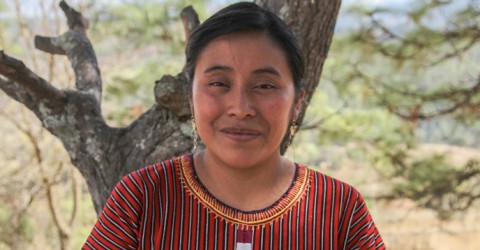
GCED Basic Search Form
Quick Search
Usted está aquí
Noticias

“I grew up in a modest family and married at the age of 15, so I could not finish school. But I was able to continue my studies at the Center,” said Isabel Aracely Tzoy Tzoc.
Like her, most girls and women in Guatemala are unable to access or complete their education. Numerous obstacles such as poverty, the distance to school, early marriage and pregnancy, and traditional gender stereotypes limit their educational opportunities.
In the municipality of Santa María Chiquimula, Department of Totonicapán, there are just over 18% of girls enrolled at middle school level (corresponding to ages 13-16). This figure drops significantly at secondary level (corresponding to ages 16-18), with only 1.36% of girls enrolled. Among the most marginalized are girls and women who live in remote mountainous areas, accessible after one hour by foot from Santa María Chiquimula.
It is in this context and location that the UNESCO Malala Center was established in 2018. Supported by the UNESCO Malala Fund for Girls’ Right to Education, the Center provides girls and women information on flexible educational opportunities, and offers participation in various personal development workshops. Isabel, now 27, has benefitted from the programmes of the Center.
Soon after getting married, Isabel suffered from domestic abuse and endured physical and psychological violence from her husband. Her son Cristóbal, aged 10, started reproducing violent behavior in pre-school. She managed to escape from the marriage at age 23 and set out to continue her education.
Last year Isabel heard about the UNESCO Malala Center in Santa María Chiquimula through the Educational Center Fe y Alegría, a partner in the project.
She participated in the Center’s activities, including the health and well-being programme, and feels as she has gained self-esteem. “Although talking about gender-based violence is difficult for me, taking part in the workshops has helped me cope, and I can now say that I am living a life free of violence”, she said. “It gave me value as a human being, and a drive to keep learning.”
Isabel is now studying at middle school level with the National Institute for Radiophonic Education, another key partner in the project. She is planning to complete her secondary level studies, and become a doctor so she can secure a future for her son.
The Center in Santa María Chiquimula is one of the two UNESCO Malala Centers established as part of a project in Guatemala. The project aims to establish a local educational model in rural areas that are sustainable and replicable, and build on indigenous girls’ needs and contexts. The educational programmes offered by the Centers are being implemented in indigenous languages, draw on indigenous culture, and build skills for personal and socioeconomic development.
To carry out the project, UNESCO is working with the National Literacy Committee(link is external) (CONALFA), the Ministry of Education and organizations such as the National Institute for Radiophonic Education(link is external) (IGER) and Fe y Alegria(link is external), in cooperation with the municipalities of intervention.
More information:
- UNESCO Malala Fund for Girls’ Right to Education
- Paving the way for women's education in indigenous communities of Guatemala
- Spreading hope for women’s education in Guatemala
- Girls’ and women’s voices help shape the UNESCO Malala Centers in Guatemala
URL:
https://en.unesco.org/news/how-isabel-was-empowered-continue-her-education-indigenous-guatemala
